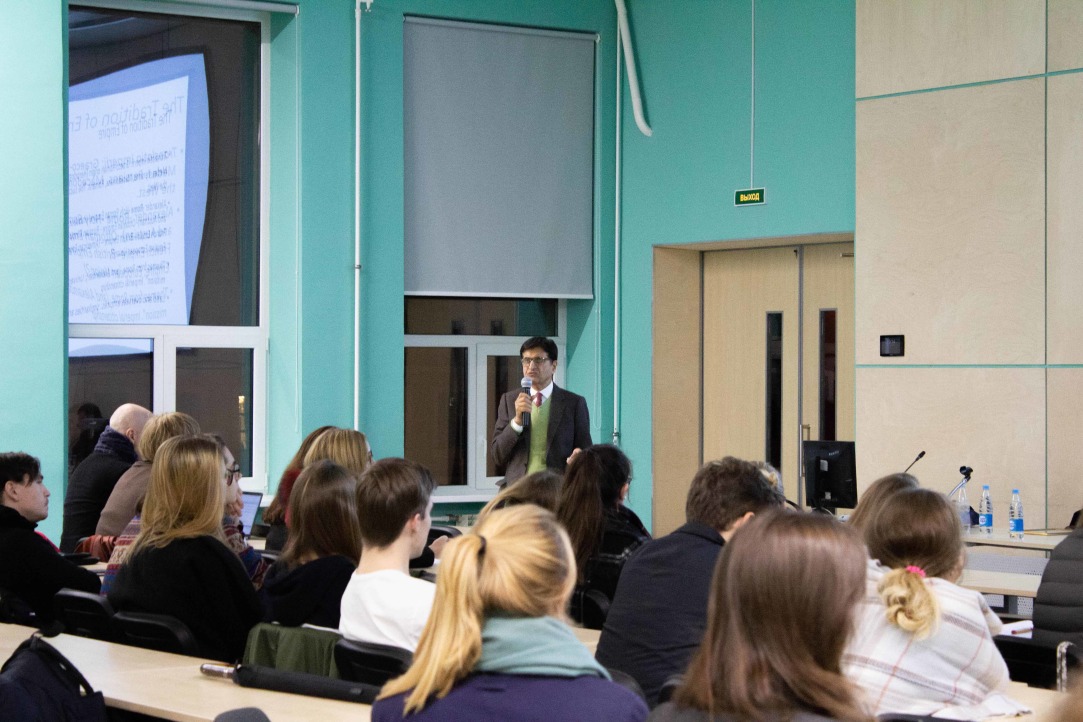«Boundaries of History»: Krishan Kumar

On October 4, Krishan Kumar represented his book «Visions of Empire: How Five Imperial Regimes Shaped the World» and gave a lecture in the frame of seminars «Boundaries of history» in Higher School of Economics.
Krishan Kumar is University Professor and William R. Kenan, Jr., Professor of Sociology at the University of Virginia. Previously he was Professor of Social and Political Thought at the University of Kent at Canterbury, England. He has been a Visiting Scholar at Harvard University, a Member of the Institute for Advanced Study, Princeton, and a Visiting Professor at the Universities of Bergen, Bristol, the Ecole des Hautes Etudes en Sciences Sociales, Paris, and the Central European University. Among his publications are Utopia and and Anti-Utopia in Modern Times (1987), 1989: Revolutionary Ideas and Ideals (2001), The Making of English National Identity (2003), and Visions of Empire: How Five Imperial Regimes Shaped the World (2017). This most recent book was a co-winner of the 2018 Barrington Moore Prize, awarded by the American Sociological Association, for the best work in comparative and historical sociology. It also won the Ab Imperio award for the best book on empires published in 2017-18.
In the beginning of the lecture Krishan Kumar paid attention to the cover of his book, which shows the family of the Habsburg’s emperor and his heirs. It presents a classic picture of essence of empire and constructions of empires, which means that everyone belongs to the one family in the empires. As a consequence, it means that everyone shares the sense of commonality and at the same time everyone preserves its own interest. The lecturer noted that the empire is the eldest political form of civilize societies and it is not a pre-modern notion. For example, tradition of empires has a «graeco-roman» origin from Herodotus. In this context the experience of the west is especially interesting, because the ideas of universalism (the feeling of ruling the whole world) and the civilizing mission appeared as well as the promise of the imperial citizenship, which seemed as a gift of the emperor to all subjects. Also, it was said a thesis that one empire succeeds the other because of the spread of religion beliefs and concepts, for instance, the attempts of the recreation of the Roman Empire and the idea Moscow the third Rome. As for differences between various empires, Krishan Kumar considers that land empires are not so distant and governments know their people better in cultural and political way, comparing with the overseas empires.
Some researchers think that temporality of empires started from the Axial Age Empires, when the world religions and empires shaped. Others consider that the European experience began in the 16th century with the colonization, and in this sense it was extremely incredible experiences, firstly, because Europeans did not have wealth and material rich. Secondly, it is unbelievable how Europeans managed to hold their imperial states together and how these countries put up with the diversity of colonial countries without extinguishment. Furthermore, Krishan Kumar thinks that empires and nationalisms create each other, for example the stimulation of the Ukrainian nationalism by the Poles, on the one hand, and Russians, on the other hand. It means that when the empire has an opportunity for constructing nationalistic ideas, it realizes it.
Moreover, we can talk about the legacy of empires, which shaped the world and led to the imperial institutions, which still exists now, in the UK, changes in culture and borders in postcolonial countries as Africa, South America. Also, the lecturer noticed that modern American political system is also similar to the informal imperial unit because of its expansion, cultural imperialism, soft power. In the modern world the European Union, on the one hand, also can be seen as an empire because of its imperial features, for example, common values, economic connections. On the other hand, European Union includes Poland, Hungary, Balkans and other eastern countries and it is based on non-violent ideology and all countries that seemed as emperies deny that they belong to that political form. Also, the author noticed that we should reasonably understand that nation-states and empires are different notions, in addition to, various nations are not necessary belong to their own political unit, like Catalans or Scots, because of modern processes and globalization which undermined national states.
To conclude, the author ends the lecture with the curious and discursive question: what political forms are needed for the era of the Anthropocene and man-made world?
